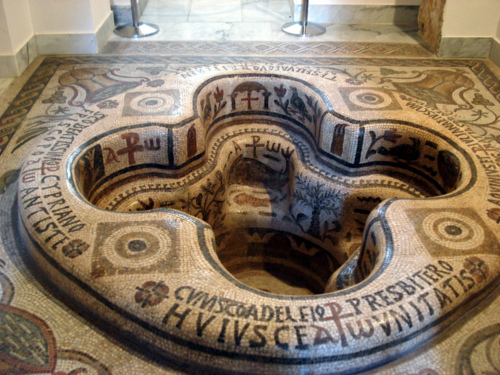Wis 1:13-15; 2:23-24
Ps 30:2, 4, 5-6, 11, 12, 13
2 Cor 8:7, 9, 13-15
Mk 5:21-43
Christians have a lot of norms–things we are supposed to do and not do. It would be easy to see Christianity as a legalistic religion, and indeed, it does sometime descend into one. But Christianity can avoid legalism without sacrificing the importance of norms by seeing rules not so much as something to be obeyed, but as truths rooted in God’s order for creation, made explicit in Christ. Broadly, we might consider this a “natural law” approach to morality. Morality then is about using one’s freedom to maintain and restore God’s order.
Although at first glance it may seem that there is not much of a connection between the readings for the week, I think it is God’s order that unites them. In our first reading from the Wisdom of Solomon (a deuterocanonical text accepted by Catholics and Orthodox but not by Protestants) we see the author showing how God’s order is connected to life and death. God created all things to live and “fashioned all things that they might have being.” Sin is disorder and death: “But by the envy of the devil, death entered the world, and they who belong to his company experience it.” In v. 12 of this chapter which directly precedes our lectionary selection, we see the normative force of this ordering of the world: “Do not invite death by the error of your life, or bring destruction by the works of your hands.”
In the passage from Mark, we see Jesus acting on this moral norm. What is beautiful about the way the author of Mark has structured this story is its chaos. There is a large crowd around Jesus from the beginning, keeping Jesus from leaving the shore. Through the din of the crowd, we might imagine Jairus really having to shout at Jesus to be heard. And as Jesus goes to help Jairus’ little daughter, the crowds follow him.
Disorder is built into the very structure of the story. Before we can figure out what happens with Jairus’ daughter, we are interrupted by a woman who has been bleeding for 12 years. Jesus senses her, despite the commotion. He sees her and heals her. But this is not only a healing; Jesus is restoring the woman’s body to order. He is allowing her body to work in the way God intended to work. We see here that in the midst of chaos, Jesus is order.
We see the same with Jairus’ daughter. Death and disorder confront us as we arrive at Jairus’ house. The scene immediately begins to grow quieter as Jesus enters the house, leaving the chaos of the crowd outside. He silences the wailing and weeping and ridicule of the mourners by casting them out of the house. As he stands over the little girl, we have a much quieter group watching Jesus. And then the ultimate order is restored as he raises the little girl. The words from the Wisdom of Solomon echo in our heads: “God did not make death, and he does not delight in the death of the living.” Jesus is the one who restores God’s order to creation. For Christians, we might say, natural law is Christological. God’s order is made explicit in Christ.
We can see this at work in our reading from Paul’s second letter to the Corinthians. Paul is asking the Corinthians for a collection and he appeals to Jesus as his norm: “For you know the generous act of our Lord Jesus Christ, that though he was rich, yet for your sakes he became poor, so that by his poverty you might become rich.” What is beautiful about this passage is the way in which God’s order made explicit through Christ is not discordant with the order we know through reason. In fact, Paul uses good old common sense to back up his argument:
“I do not mean that there should be relief for some and pressure on you, but it is a question of a fair balance between your present abundance and their need, so that their abundance may be for your need, in order that there may be a fair balance.”
Reason shows us God’s order, but Jesus makes it explicit. And we follow not because we are afraid of what might happen to us if we don’t or because we want to conform but because in following the norms, we participate in God’s order and in doing so, we have life in its fulness and help others achieve the same. The task of the Christian then is what Vatican II called “bring[ing] forth fruit in charity for the life of the world” (OT 16). Today’s readings remind us that Christianity is first a religion of life, not rules. The rules are just pointing the way to the abundant life that Jesus promises (Jn. 10:10).




